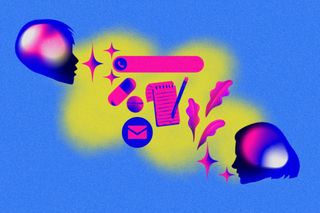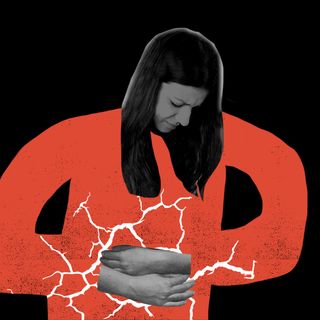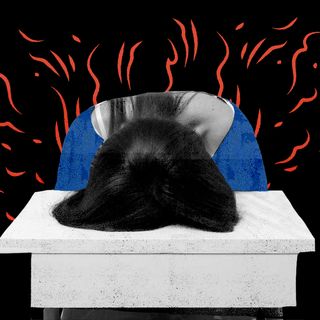
Indian Mental Health Professionals Continue To Be Ignorant About Neurodivergence. How Are People Coping?
Without access to empathetic therapists, the only recourse for neurodivergent people is informal networks created by others in the community.

I was 15 when I was first prescribed antidepressants; since then, I’ve been in and out of therapy, too. But it wasn’t until I turned 29 that I was diagnosed with autism and ADHD. In fact, at 25, when I’d tried to suggest I might have ADHD and seek an evaluation, an ex-therapist told me I was overthinking, leaving me feeling invalidated. What I didn’t know, then, was how poor the understanding of neurodivergence, and especially autism and ADHD, was — and continues to be — among mental health professionals in India. Even after my diagnosis, the first psychiatrist I was referred to decided to question my neurodivergence simply because I didn’t look autistic to her on a 10-minute video call. All this medical gaslighting left me scarred and unable to get myself to see a psychiatrist for another year, even though I struggled constantly without psychiatric aids.
My experience is far from being an isolated one. Mental health professionals in India are largely ignorant about neurodivergence, not only denying people like me the help we so desperately need but also worsening our mental health through their invalidation of our struggles. “Medical gaslighting is trauma… [S]o many people, who come into my clinic every day, have been gaslit, blamed, and dismissed by medical and mental health professionals,” says Anindita Kundu, a mental health professional, who is neurodivergent themself.
The driving factor behind this medical gaslighting doesn’t stem from an intention to invalidate patients. Instead, it is inertia that keeps professionals from being updated about developments in research surrounding neurodivergence. For instance, research has established that autistic and ADHD people routinely mask in order to prevent getting bullied or ostracized, a survival strategy that is developed as early as childhood. Eventually, masking becomes our default whenever we are subjected to an external gaze — even from therapists. However, many Indian mental health professionals refuse to challenge their notions of what an autistic or ADHD person looks like.
This is precisely what happened with the psychiatrist who chose to disregard the diagnoses I had already received. She went as far as to say that she was aware of all the research on autism and had never heard of any diagnostic tool to assess autism in adults. Evidently, she wasn’t aware of tools like the Ritvo Autism Asperger Diagnostic Scale-Revised (RAADS-R), the Autism Diagnostic Observation Schedule, Second Edition Module 4 (ADOS-2), and the Developmental, Dimensional, and Diagnostic Interview-Adult Version (3Di-Adult), among others.
Rakshita Shekhar, too, had very similar experiences. For years, mental health professionals dismissed her self-diagnosis of autism because she “looked too normal” to be autistic. “One [doctor] said I couldn’t be autistic because I had recently had a baby, which was proof of a good sex life. Another one asked my husband if he wanted to leave me … Yet another one said I spoke so well that I couldn’t be autistic,” she recalls. Such disbelief and rejection from trained professionals not only invalidates the lived experience and questions neurodivergent symptoms and identities but also breeds internalized ableism, leading many on the spectrum to develop imposter syndrome.
Related on The Swaddle:
Not Every Autistic Person is a ‘Savant.’ But the Stereotype Has Significant Mental Health Costs.
Many autistic and ADHD people who mask well are misdiagnosed instead with bipolar disorder (BD), borderline personality disorder (BPD), and obsessive-compulsive disorder (OCD) — conditions that also fall under the neurodivergence umbrella. Again, this happens because these people don’t look “abnormal” or “unintelligent” enough to be autistic and ADHD — biases can make their symptoms appear to be emanating from other conditions.
One reason for the vast amount of misunderstanding is the fact that autism research has excluded autistic voices for decades, creating a generation of misinformed mental health professionals, who are now set in their ways. “Too much [of autism research] fails to acknowledge autistics as people who can read and make valuable contributions to the field … This shortsightedness damages research and scientists’ ability to help autistic people,” writes Elle Loughran, a genetics scholar at Trinity College Dublin who is autistic herself.
Although the digital era does grant neurodivergent individuals access to resources that can enable them to battle the ignorance among mental health professionals, self-advocacy still remains incredibly challenging. Living with a condition like autism entails communication deficits and struggling with a lack of vocabulary to accurately capture one’s experiences due to the lack of research awareness about how these conditions present among individuals who aren’t White cis males.
In addition, “there is an inherent power hierarchy within the four walls of the clinic,” as Kundu points out. “The patient coming in is already vulnerable and is already going through a lot. It is the job of the professional, there, to question this power that we, as healthcare professionals, hold, and share it with the client so that they can feel safe in that space.”
One way to reduce the ignorance surrounding neurodivergence in the mental health space is to have therapists who are neurodivergent themselves on board. Many autistic people have a higher degree of empathy, which could not only advantage neurodivergent clients but also neurotypical ones. “[T]he way I empathize is different from those who are not on the spectrum. Not only do I feel that I can almost embody the feelings and emotions of someone I am close to, but the way I relate to their experiences and stories is different too. My mind will often match their experience with an experience in my memory that most aligns with what they are describing,” writes Louise Taylor, a therapist who is autistic.
Related on The Swaddle:
What Makes an ‘Autistic Burnout’ Different From a Regular Burnout?
Unfortunately, however, not only are neurodivergent individuals often gatekept from the profession, but are also often subjected to biases from able-bodied, neurotypical mental health professionals. “Post my understanding and acceptance of my neurodivergence, almost every interview that I gave for a full-time therapist job, I was not selected… They saw my condition as incapability,” says Tanuka Ray, a psychotherapist from Bangalore. This is reflective of the same bias that causes many mental health professionals to gatekeep diagnoses, too, simply because they believe a neurodivergent person cannot finish their education, be hired to work, enter relationships, or even have sex; they’re viewed as children, basically.
“I was asked also in some interviews if I am taking therapy to ‘treat’ my ADHD or improve my focus… When I said that my journey with neurodivergence, even in a therapeutic space, is about being kinder to myself, understanding my limitations, and not having harsh expectations of myself, they didn’t like it,” Ray adds.
Without access to empathetic therapists — or any effective recourse from the healthcare system — many autistic and ADHD individuals have come to rely on informal networks to find out about competent mental health professionals. I myself was referred by Shekhar to the professional who finally diagnosed her. I met my current psychiatrist, too, after another neurodivergent woman assured me he wasn’t like the others.
For those without access to such informal networks, the media comes to the rescue. S., 25, realized she was neurodivergent when she stumbled upon a stand-up clip of Hannah Gadsby, an Australian comedian who received her autism diagnosis in her late 30s. Interestingly, Gadsby, too, was gaslit even after she received her diagnosis; she was told she was “too empathetic,” “too social,” and “too female” to be autistic.
Soon after, S. connected with a professional from Pennsylvania, who gave her an unofficial autism diagnosis that was later confirmed by her therapist. But when she sought financial help from her parents to pay her mounting therapy bills, they forced her to seek a second opinion from another professional, who mocked, invalidated, and summarily dismissed her experiences — reducing her struggles to a “silly little girl crying over a boyfriend.” Such is the consequence, often, of seeking the opinion of a professional not recommended by our fellow neurodivergent people.
The fact that neurodivergent people still have to shoulder the unfair burden of finding competent, empathetic professionals is emblematic of how the mental health infrastructure has failed us. Addressing the alarming ignorance surrounding neurodivergence among mental health professionals in India would require a systemic overhaul to make research on neurodivergence more inclusive, employ professionals who are neurodivergent themselves, and train neurotypical professionals to question power dynamics, listen to neurodivergent voices, and allow their clients’ lived experiences to inform their own perspectives.
Devrupa Rakshit is an Associate Editor at The Swaddle. She is a lawyer by education, a poet by accident, a painter by shaukh, and autistic by birth. You can find her on Instagram @devruparakshit.
Related


Ovulation Cramps Aren’t Discussed as Often as Menstrual Cramps. Are They Normal?
